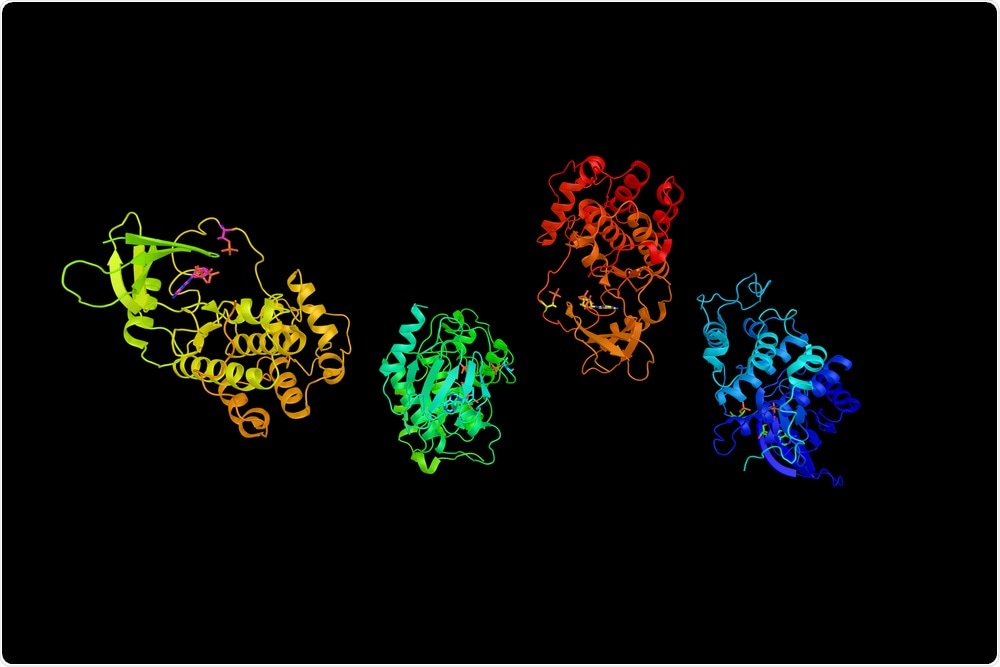A study headed by the University of Colorado Boulder has revealed a specific protein that is crucial for regulating the growth, proliferation, and function of cells, and how these cells were long implicated in the development of tumors.

Image Credit: ibreakstock/Shutterstock.com
Published recently in the Genes and Development journal, the latest findings may lead to the development of novel treatments for hard-to-treat cancers and may also inform new treatments for neurological diseases as well as rare developmental disorders, stated the study’s authors.
“These findings could have a broad biomedical application,” stated Dylan Taatjes, the study’s lead author and a professor in the Department of Biochemistry.
Scientists have known for many years that the protein called, Cyclin-Dependent Kinase 7 (CDK7), plays a crucial role in aiding all types of cells to decode, or transcribe, the genetic instructions given by their DNA.
As explained by Taatjes, every cell contains the same massive library or genome; however, a kidney cell may turn to different parts of that vast library for instructions than, for example, a heart cell or a skin cell.
Similar to a librarian, the CDK7 protein makes sure that every cell has access to the right instructions at the right time, directing which kinds of genes get switched on and off.
Although that is significant at the time of human development and for the regular function of cells, the CDK7 protein can be manipulated by tumor cells to fuel the runaway growth. In the recent past, scientists have found that the protein can drive specific cancers to spread out of control, such as “triple-negative” breast cancers, which are known to be more aggressive and do not respond well to standard therapies.
This discovery has triggered a growing interest in the development of the supposed “CDK7-inhibitors” but owing to a lack of understanding related to the actual function of the CDK7 protein, previous clinical trials have been inadequate.
We wanted to find out exactly how it's really working inside human cells.”
Dylan Taatjes, Study Lead Author and Professor, Department of Biochemistry, University of Colorado Boulder
As such, the Taatjes laboratory collaborated with researchers from two pharmaceutical firms—Syros and Paraza—and with colleagues in other laboratories at the University Of Colorado Boulder, the University of Colorado School of Medicine, and the BioFrontiers Institute.
Using basic biochemistry, advanced analytical methods, and next-generation genetic sequencing, the researchers detected scores of specific proteins that are switched on or off by the CDK7 protein, for the first time. This study provided an unparalleled insight into its role in cells.
The research work also showed that:
- The CDK7 protein plays a key role in numerous stages of transcription (that is, decoding the genome), shaping the so-called “transcriptional splicing,” wherein the unnecessary components of the transcribed genome are removed to leave only those required for the cellular job at hand. Most significantly, splicing errors have been associated with various diseases, such as blood cancers.
- The CDK7 protein acts as a “master regulator” of other major enzymes, converting them on to additionally fuel transcriptional programs. Errors in performing these transcriptional programs have been associated with cognitive diseases, such as Alzheimer’s disease as well as rare developmental disorders, like facial and head deformities.
- The activity of the CDK7 protein is regulated by the company it keeps. When fixed to a larger 10-protein complex, called TFIIH, CDK7 is mostly inactive. However, when this inhibitor breaks off on its own, its activity increases way up.
At present, phase 1 trials are on-going and administering the new version of CDK7 inhibitors to drug-resistant lung, breast, ovarian, colorectal, and pancreatic cancer patients.
The results of the latest study indicate that these drugs hold great potential, added Professor Taatjes.
“In biology, it is widely recognized that cells will compensate by activating other enzymes if one specific enzyme is inhibited," Professor Taatjes. Describing the mechanism behind drug resistance.
Our results suggest that CDK7 inhibitors could have distinct therapeutic advantages, given that they would not only block CDK7, but would impact the function of other enzymes.”
Dylan Taatjes, Study Lead Author and Professor, Department of Biochemistry, University of Colorado Boulder
The study may result in the development of advanced therapeutics, which—rather than silencing the protein fully—would target it only in its most, liberated active phase. This may lead to more selective inhibitors that would cause less damage to healthy cells, with minimal side effects.
And due to its various roles in shaping the development and function of human cells, other applications may also be viable.
“Cancer is an obvious application but it is by no means the only one,” concluded Professor Taatjes.
Source:
Journal reference:
Rimel, J, K., et al. (2020) Selective inhibition of CDK7 reveals high-confidence targets and new models for TFIIH function in transcription. doi.org/10.1101/gad.341545.120